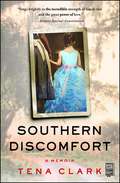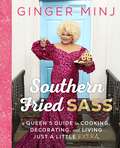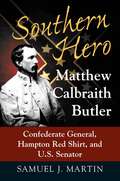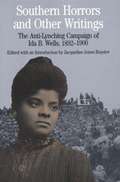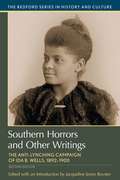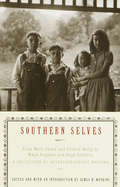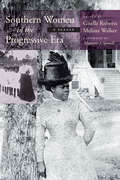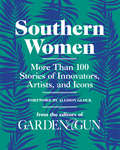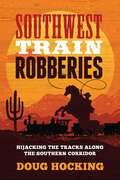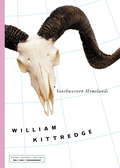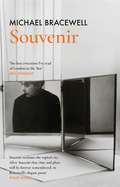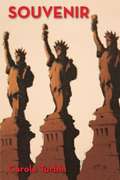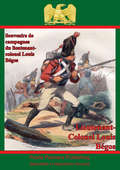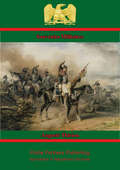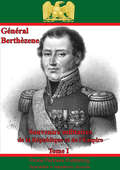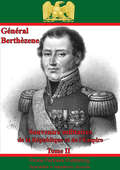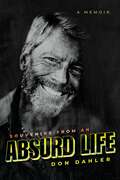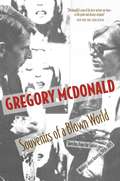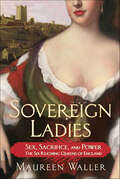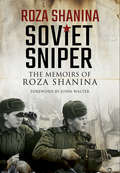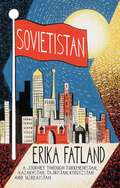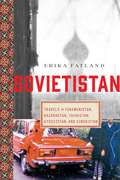- Table View
- List View
Southern Discomfort: A Memoir
by Tena Clark&“Southern Discomfort is a raw, thought-provoking examination of privilege, racism, sexism, the masks we wear to conform to society&’s expectations, and the journey toward authentic identity.&” —Read with Us: Caste, An Oprah&’s Book Club Discussion Guide For fans of beloved memoirs like Educated and The Glass Castle, a &“raw and deeply honest&” (Publishers Weekly, starred review) true story set in rural Mississippi during the Civil Rights era about a white girl coming of age in a repressive society and the woman who gave her the strength to forge her own path—the black nanny who cared for her.In her memoir that is a &“story of love and fury&” (Jackson Clarion-Ledger), Grammy Award-winning songwriter and producer Tena Clark recounts her chaotic childhood in a time fraught with racial and social tension. Tena was born in 1953 in a tiny Mississippi town close to the Alabama border, where the legacy of slavery and racial injustice still permeated every aspect of life. On the outside, Tena&’s childhood looked like a fairytale. Her father was one of the richest men in the state; her mother was a regal beauty. The family lived on a sprawling farm and had the only swimming pool in town; Tena was given her first car—a royal blue Camaro—at twelve. But behind closed doors, Tena&’s family life was deeply lonely and dysfunctional. By the time she was three, her parents&’ marriage had dissolved into a swamp of alcohol, rampant infidelity, and guns. Adding to the turmoil, Tena understood from a very young age that she was different from her three older sisters, all of whom had been beauty queens and majorettes. Tena knew she didn&’t want to be a majorette—she wanted to marry one. On Tena&’s tenth birthday, her mother, emboldened by alcoholism and enraged by her husband&’s incessant cheating, walked out for good, instantly becoming an outcast in their society. Tena was left in the care of her nanny, Virgie, even though she was raising nine of her own children and was not allowed to eat from the family&’s plates or use their bathroom. It was Virgie&’s acceptance and unconditional love that gave Tena the courage to stand up to her domineering father, the faith to believe in her mother&’s love, and the strength to be her true self. Combining the spirit of brave coming-of-age memoirs such as The Glass Castle and vivid, evocative Southern fiction like To Kill a Mockingbird, Southern Discomfort is &“an unforgettable southern story… [that] sings brightly to the incredible strength of family ties and the great power of love&” (The Atlanta Journal-Constitution) and is destined to become a new classic.
Southern Fried Sass: A Queen's Guide to Cooking, Decorating, and Living Just a Little "Extra"
by Ginger MinjRuPaul&’s Drag Race superstar Ginger Minj shares her favorite recipes, best advice, and wildest stories in this hilarious book that&’s part memoir, part cookbook. Perfect for fans of Trixie and Katya&’s Guide to Modern Womanhood.Drag icon Ginger Minj brings her signature humor and sass to this tongue-in-cheek memoir-cum-life manual-cum-cookbook. Featuring Ginger&’s favorite Southern-inspired recipes, Southern Fried Sass showcases some of her most vulnerable and celebratory moments, revealing the most valuable lessons she&’s learned after years in drag and the pearls of wisdom she&’s gleaned from her grandmother&’s personal brand of Southern resilience. You&’ll cheer for Ginger as she spills the tea with exclusive behind-the-scenes details from three seasons of RuPaul&’s Drag Race and offers her best advice on everything from contouring to cooking and setting the table for a full-on Southern-style Thanksgiving dinner. Did we say dinner? Here, you&’ll find more than fifty recipes, including The Minx&’s Sick&’ning Scalloped Pineapple Paradise, Red Barn BBQ Ribs platter, Better Than Sex cake, and countless other decadent desserts. From fighting for what you&’re worth to looking good on a motorcycle as a big girl to finding love while also making damn good cupcakes, this is the perfect gift for anyone who wants to live their best life.
Southern Hero
by Samuel J. MartinAs a member of a distinguished South Carolina family, Matthew Calbraith Butler led a most interesting life. His cavalry service during the Civil War saw him rise from regimental captain to major general in command of a division. He began the war with Jeb Stuart and participated in all of his early campaigns. Butler was wounded in the battle at Brandy Station and lost his foot as a result, but he returned to duty and the battles outside of Richmond in 1864, then hurried South to resist Sherman's advance into South Carolina. Unlike many other Confederate generals, Butler remained influential after the War. He served in the U.S. Senate for eighteen years, oversaw the end of Reconstruction in South Carolina, and was a major general during the Spanish-American War.
Southern Horrors and Other Writings: The Anti-Lynching Campaign of Ida B. Wells, 1892-1900
by Jacqueline Jones RoysterIda B. Wells was an African-American woman who achieved national and international fame as a journalist, public speaker, and community activist. This volume collects three pamphlets that constitute her major works during the anti-lynching movement: Southern Horrors: Lynch Law in All Its Phases, A Red Record, and Mob Rule in New Orleans.
Southern Horrors and Other Writings: The Anti-lynching Campaign Of Ida B. Wells, 1892-1900 (The Bedford Series In History And Culture)
by Jacqueline RoysterGain insight into the life of Ida B. Wells as Southern Horrors and Other Writings illustrates how events like yellow fever epidemic transformed her into a internationally famous journalist, public speaker, and activist at the turn of the twentieth century.
Southern Selves: From Mark Twain and Eudora Welty to Maya Angelou and Kaye Gibbons--A Collection of Autobiographical Writing
by James WatkinsThe memoirist seek to capture not just a self but an entire world, and in this marvelous anthology thirty-one of the South's finest writers--writers like Kaye Gibbons and Reynolds Price, Eudora Welty and Harry Crews, Richard Wright and Dorothy Allison--make their intensely personal contributions to a vibrant collective picture of southern life. In the hands of these superb artists, the South's rich tradition of storytelling is brilliantly revealed. Whether slave or master, intellectual or "redneck," each voice in this moving and unforgettable collection is proof that southern literature richly deserves its reputation for irreverent humor, exquisite language, a feeling for place, and an undying, often heartbreaking sense of the past.From the Trade Paperback edition.
Southern Women in the Progressive Era: A Reader (Women's Diaries and Letters of the South)
by Giselle Roberts and Melissa Walker“Stories of personal tragedy, economic hardship, and personal conviction . . . a valuable addition to both southern and women’s history.” —Journal of Southern HistoryFrom the 1890s to the end of World War I, the reformers who called themselves progressives helped transform the United States, and many women filled their ranks. Through solo efforts and voluntary associations both national and regional, women agitated for change, addressing issues such as poverty, suffrage, urban overcrowding, and public health. Southern Women in the Progressive Era presents the stories of a diverse group of southern women—African Americans, working-class women, teachers, nurses, and activists—in their own words, casting a fresh light on one of the most dynamic eras in US history.These women hailed from Virginia to Florida and from South Carolina to Texas and wrote in a variety of genres, from correspondence and speeches to bureaucratic reports, autobiographies, and editorials. Included in this volume, among many others, are the previously unpublished memoir of civil rights activist Mary McLeod Bethune, who founded a school for black children; the correspondence of a textile worker, Anthelia Holt, whose musings to a friend reveal the day-to-day joys and hardships of mill-town life; the letters of the educator and agricultural field agent Henrietta Aiken Kelly, who attempted to introduce silk culture to southern farmers; and the speeches of the popular novelist Mary Johnson, who fought for women’s voting rights. Always illuminating and often inspiring, each story highlights the part that regional identity—particularly race—played in health and education reform, suffrage campaigns, and women’s club work.Together these women’s voices reveal the promise of the Progressive Era, as well as its limitations, as women sought to redefine their role as workers and citizens of the United States.
Southern Women: More Than 100 Stories of Innovators, Artists, and Icons (Garden & Gun Books #5)
by Editors of Garden and GunFrom the award-winning Southern lifestyle magazine Garden & Gun comes this rich collection of some of the South’s most notable women.For too long, the Southern woman has been synonymous with the Southern belle, a “moonlight and magnolias” myth that gets nowhere close to describing the strong, richly diverse women who have thrived because of—and in some cases, despite of—the South. No more. Garden & Gun’s Southern Women: More than 100 Stories of Trail Blazers, Visionaries, and Icons obliterates that stereotype by sharing the stories of more than 100 of the region’s brilliant women, groundbreakers who have by turns embraced the South’s proud traditions and overcome its equally pervasive barriers and challenges. Through interviews, essays, photos, and illustrations these remarkable chefs, musicians, actors, writers, artists, entrepreneurs, designers, and public servants will offer a dynamic portrait of who the Southern woman is now. The voices of bona fide icons such as Sissy Spacek, Leah Chase, and Loretta Lynn join those whose stories for too long have been overlooked or underestimated, from the pioneering Texas rancher Minnie Lou Bradley to the Gee’s Bend, Alabama, quilter Mary Margaret Pettway—all visionaries who have left their indelible mark not just on Southern culture, but on America itself. By reading these stories of triumph, grit, and grace, the ties that bind the sisterhood of Southern women emerge: an unflinching resilience and resourcefulness, an inherent love of the land, a singular style and wit. And while the wisdom shared may be rooted in the Southern experience, the universal themes are sure to resonate beyond the Mason-Dixon.
Southwest Train Robberies: Hijacking the Tracks along the Southern Corridor
by Doug HockingIn 1854, the United States acquired the roughly 30,000-square-mile region of present-day southern Arizona and southwestern New Mexico from Mexico as part of the Gadsden Purchase. This new Southern Corridor was ideal for train routes from Texas to California, and soon tracks were laid for the Southern Pacific and Santa Fe rail lines. Shipping goods by train was more efficient, and for desperate outlaws and opportunistic lawmen, robbing trains was high-risk, high-reward. The Southern Corridor was the location of sixteen train robberies between 1883 and 1922. It was also the homebase of cowboy-turned-outlaw Black Jack Ketchum&’s High Five Gang. Most of these desperadoes rode the rails to Arizona&’s Cochise County on the US-Mexico border where locals and lawmen alike hid them from discovery. Both Wyatt Earp and Texas John Slaughter tried to clean them out, but it took the Arizona Rangers to finish the job. It was a time and place where posses were as likely to get arrested as the bandits. Some of the Rangers and some of Slaughter&’s deputies were train robbers. When rewards were offered there were often so many claimants that only the lawyers came out ahead.Southwest Train Robberies chronicles the train heists throughout the region at the turn of the twentieth century, and the robbers who pulled off these train jobs with daring, deceit, and plain dumb luck! Many of these blundering outlaws escaped capture by baffling law enforcement. One outlaw crew had their own caboose, Number 44, and the railroad shipped them back and forth between Tucson and El Paso while they scouted locations. Legend says one gang disappeared into Colossal Cave to split the loot leaving the posse out front while they divided the cash and escaped out another entrance. The antics of these outlaws inspired Butch Cassidy and the Sundance Kid to blow up an express car and to run out guns blazing into the fire of a company of soldiers.
Southwestern Homelands
by William KittredgeFor part of each of the last twenty years, much-loved essayist and fiction writer William Kittredge has ventured to the storied desert landscape of the Southwest and immersed himself in the region's wide-ranging wonders and idiosyncrasies. Here Kittredge brings all this experience to bear as he takes us on a rewarding tour of the territory that runs from Santa Fe to Yuma, and from the Grand Canyon on south through Phoenix and Tucson to Nogales. It is a region where urban sprawl abuts desert expanse, where Native American pueblos compete for space with agribusiness cotton plantations, and where semi-defunct mining towns slowly give way to new-age hippie gardening and crafts enclaves. As part-time resident and full-time observer, William Kittredge acquaints us with one of the country's most vital and perpetually evolving regions. Populated with die-hard desert rats on the banks of the Colorado, theoretical physicists in Albuquerque, Hopi mothers and their daughters, and renegade punk-rock kids sleeping in the streets, Southwestern Homelandsis a book as much about the legacies of a territory's colorful past as it is about the alternately exciting and daunting complexities of its immediate future.
Souvenir
by Michael Bracewell'The best evocation I've read of London in the '80s' Neil Tennant'A suspended act of retrieval, a partisan recall; a sustained, subtle summary of our recent past, and an epitaph for a future we never had' Philip Hoare'Michael Bracewell proves himself to be nothing less than the poet laureate of late capitalism' Jonathan CoeA vivid eulogy for London of the late 1970s and early 80s - the last years prior to the rise of the digital city. An elliptical, wildly atmospheric remembrance of the sites and soundtrack, at once aggressively modern and strangely elegiac, that accompanied the twilight of one era and the dawn of another. Haunted bedsits, post-punk entrepreneurs in the Soho Brasserie, occultists in Fitzrovia, Docklands before Canary Wharf, frozen suburbs in the winter of 1980...
Souvenir
by Michael Bracewell'The best evocation I've read of London in the '80s' Neil Tennant'A suspended act of retrieval, a partisan recall; a sustained, subtle summary of our recent past, and an epitaph for a future we never had' Philip Hoare'Michael Bracewell proves himself to be nothing less than the poet laureate of late capitalism' Jonathan CoeA vivid eulogy for London of the late 1970s and early 80s - the last years prior to the rise of the digital city. An elliptical, wildly atmospheric remembrance of the sites and soundtrack, at once aggressively modern and strangely elegiac, that accompanied the twilight of one era and the dawn of another. Haunted bedsits, post-punk entrepreneurs in the Soho Brasserie, occultists in Fitzrovia, Docklands before Canary Wharf, frozen suburbs in the winter of 1980...
Souvenir: A Memoir
by Carole TurbinCAROLE TURBIN'S SOUVENIR COMBINES vivid writing, photographs, and art to tell the arresting story of growing up in Queens, New York, in the1940s and '50s with a distant mother and a mercurial father who sold souvenirs of New York to retail shops in Times Square and Chinatown. Finagler, practical jokester, gambler, and later magician--he could swing from angry rejector to loving parent. The author escaped for two decades to Europe and California, becoming an artist, feminist, and historian. Much later, when he was an old man and she was middle-aged, she realized that he'd encouraged her art by advising, "If you're afraid, draw it," and that she shared his strong emotions and determination. She drew images of plumbing that conveyed her visceral childhood fears and made peace with him, drawing his portrait on his deathbed.
Souvenirs De Campagnes Du Lieutenant-Colonel Louis Bégos
by Lieutenant-Colonel Louis Bégos« Souvenirs de campagnes du lieutenant-colonel Louis Bégos, ancien capitaine adjudant-major au 20 régiment suisse au service de la France. Lausanne, Delafontaine, 1859, in-8°, 188 p.Bégos a voulu par réaction contre Thiers qu'il accuse d'avoir oublié le rôle des soldats suisses, dans les armées napoléoniennes, raconter sa participation aux opérations militaires en Italie, en Espagne et en Russie. » p 14 - Professeur Jean Tulard, Bibliographie Critique Des Mémoires Sur Le Consulat Et L'Empire, Droz, Genève, 1971
Souvenirs Militaires
by Auguste ThirionThis ebook is purpose built and is proof-read and re-type set from the original to provide an outstanding experience of reflowing text for an ebook reader. « Scènes pittoresques de bivouacs ou de batailles, intéressant les campagnes de Pologne, d'Espagne, de Russie et d'Allemagne et s'achevant sur le portrait de Marmont que le justifie. » p 163 - Professeur Jean Tulard, Bibliographie Critique Des Mémoires Sur Le Consulat Et L'Empire, Droz, Genève, 1971 Auguste Thirion (1787-1869)
Souvenirs Militaires De La République Et De l’Empire Tome I (Souvenirs Militaires De La République Et De l’Empire #1)
by Général Baron Pierre Berthezène« Souvenirs militaires de la République et de l'Empire. Paris, Dumaine, 1855, 2 vol. in-8°. Portr.Bon récit de la seconde campagne d'Italie (pp. 85-108) et surtout des opérations en Prusse et de l'occupation du pays : recensement des ressources (donations, problème de la monnaie... (pp. 111-168). Nombreux détails, mais des inexactitudes, sur la campagne d'Autriche (pp. 169-270), l'expédition d'Anvers (pp. 273-283). La guerre en Russie occupe les dernières pages du tome I et le début du tome II. La campagne de 1813 est également racontée de façon détaillée. A peu près rien en revanche sur la campagne de France. Les souvenirs s'achèvent sur les opérations de 1815. C'est par cette partie que Berthezène avait commencé la rédaction de ses mémoires en 1816. Malgré quelques erreurs, il a l'avantage sur d'autres généraux, de s'attacher à décrire les pays occupés ou envahis. » p 16 - Professeur Jean Tulard, Bibliographie Critique Des Mémoires Sur Le Consulat Et L'Empire, Droz, Genève, 1971
Souvenirs Militaires De La République Et De l’Empire Tome II (Souvenirs Militaires De La République Et De l’Empire #2)
by Général Baron Pierre Berthezène« Souvenirs militaires de la République et de l'Empire. Paris, Dumaine, 1855, 2 vol. in-8°. Portr.Bon récit de la seconde campagne d'Italie (pp. 85-108) et surtout des opérations en Prusse et de l'occupation du pays : recensement des ressources (donations, problème de la monnaie... (pp. 111-168). Nombreux détails, mais des inexactitudes, sur la campagne d'Autriche (pp. 169-270), l'expédition d'Anvers (pp. 273-283). La guerre en Russie occupe les dernières pages du tome I et le début du tome II. La campagne de 1813 est également racontée de façon détaillée. A peu près rien en revanche sur la campagne de France. Les souvenirs s'achèvent sur les opérations de 1815. C'est par cette partie que Berthezène avait commencé la rédaction de ses mémoires en 1816. Malgré quelques erreurs, il a l'avantage sur d'autres généraux, de s'attacher à décrire les pays occupés ou envahis. » p 16 - Professeur Jean Tulard, Bibliographie Critique Des Mémoires Sur Le Consulat Et L'Empire, Droz, Genève, 1971
Souvenirs d’un Officier de La Grande Armée,: publié par Maurice Barrès, son petit-fils.
by Maurice Barrès Jean-Baptiste Barrès« Souvenirs d'un Officier de La Grande Armée, publié par Maurice Barrés, son petit-fils. Paris Plon, 1923, in-16, 332 p... Maurice Barrés a bien mis en lumière dans sa préface ce qu'il y a de naïf et de savoureux dans ces souvenirs de son grand-père, vélite de la Garde. On Lira avec amusement le récit du sacre, celui d'Austerlitz et sa célèbre veillée, l'entrevue de Tilsit, la nomination au grade de sous-lieutenant, le Portugal en 1810, la campagne d'Allemagne... » p 11 - Professeur Jean Tulard, Bibliographie Critique Des Mémoires Sur Le Consulat Et L'Empire, Droz, Genève, 1971
Souvenirs from an Absurd Life: A Memoir
by Don DahlerOne man&’s unlikely rise from bartender to national television reporter and the incredible adventures he&’s had along the way.Hockey great Wayne Gretzky famously noted, &“You miss one hundred percent of the shots you don&’t take.&” Don Dahler took these words to heart, causing his entire life to change in a remarkable way. Souvenirs from an Absurd Life presents true stories about a relative nobody once struggling to make rent before he decided he would not accept what appeared to be a dim, boring, unfulfilling future. Instead, Dahler charted a new course for himself, somehow landing an award-winning career as a network correspondent and news anchor, covering a vast array of subjects, including wars, the attacks of 9/11, and the biggest stories of the times for FOX, CNBC, ABC, and CBS News. Despite the considerable odds against him, Don Dahler took his shot, and he made it.
Souvenirs of a Blown World: Sketches for the Sixties, Writings about America, 1966-1973
by Gregory McdonaldBestselling author of the Fletch series Gregory Mcdonald presents firsthand accounts of major events during the sixties and interviews with Joan Baez, Abbie Hoffman, Krishnamurti, Phil Ochs, Andy Warhol, and others. The year was 1966, and fresh off the heels of his controversial debut novel Running Scared, Mcdonald was hired to write for the Boston Globe with the instruction to "Go and have fun and write about it, and if you end up cut and bleeding on the sidewalk, call the office." Souvenirs of a Blown World is an exuberant account of the people, the encounters, and emotions that raced through the nation during those indelible years.You will follow a war-battered young soldier through the steamy quagmire of Vietnam, attend a barbeque bash in Dallas for the opening of John Wayne's two hundred and first picture, watch Jack Kerouac booze himself into hallucinatory eloquence, and run through the streets of Chicago during the 1968 Democratic National Convention. Captured in kaleidoscopic prose, this is the vanished world of America's revolt, the explosive second adolescence that shook old institutions to their foundations . . . the time we must relive and understand if we are to understand and live through our own.
Sovereign Ladies: Sex, Sacrifice, and Power: The Six Reigning Queens of England
by Maureen WallerMaureen Waller has written a fascinating narrative history---a brilliant combination of drama and biographical insight on the British monarchy---of the six women who have ruled England in their own names. In the last millennium there have been only six English female sovereigns: Mary I and Elizabeth I, Mary II and Anne, Victoria and Elizabeth II. With the exception of Mary I, they are among England's most successful monarchs. Without Mary II and Anne, the Glorious Revolution of 1688 might not have taken place. Elizabeth I and Victoria each gave their name to an age, presiding over long periods when Britain made significant progress in the growth of empire, prestige, and power. All of them have far-reaching legacies. Each faced personal sacrifices and emotional dilemmas in her pursuit of political power. How to overcome the problem of being a female ruler when the sex was considered inferior? Does a queen take a husband and, if so, how does she reconcile the reversal of the natural order, according to which the man should be the master? A queen's first royal duty is to provide an heir to the throne, but at what cost? In this richly compelling narrative of royalty, Maureen Waller delves into the intimate lives of England's queens regnant in delicious detail, assessing their achievements from a female perspective.
Soviet Sniper: The Memoirs of Roza Shanina
by Roza ShaninaDescribed as the ‘unseen terror of East Prussia’, Soviet World War II sniper, Roza Shanina was celebrated for her remarkable shooting accuracy and astonishing bravery. Volunteering for military service after the death of her brother in 1941, she fought her way to the frontline and became a key player in a number of major battles. With 59 confirmed Nazi kills, she became the first servicewoman of the 3rd Belorussian Front to receive the Order of Glory. Although it was strictly forbidden within the Soviet military to keep a combat diary, Shanina managed to maintain hers throughout the last 4 months of her life. In it, she describes the hardships, triumphs, mundanities and extremities of war, the relationships formed and the comrades lost. Translated into English for the first time, the diary is a rare insight into the complexities of what is was to be both a sniper and a woman on the frontline and stands as a testament to Shanina’s humor, determination, extraordinary courage and indefatigable spirit.
Sovietistan: A Journey Through Turkmenistan, Kazakhstan, Tajikistan, Kyrgyzstan and Uzbekistan
by Erika Fatland"A mesmerising trip across Central Asia . . . A fascinating travelogue" Financial TimesSHORTLISTED FOR EDWARD STANFORD/LONELY PLANET DEBUT TRAVEL WRITER OF THE YEAR 2020Erika Fatland takes the reader on a journey that is unknown to even the most seasoned globetrotter. The five former Soviet Republics' Kazakhstan, Kyrgyzstan, Tajikistan, Turkmenistan and Uzbekistan all became independent when the Soviet Union fell apart in 1991. How have these countries developed since then? In the Kyrgyzstani villages Erika Fatland meets victims of the widely known tradition of bride snatching; she visits the huge and desolate Polygon in Kazakhstan where the Soviet Union tested explosions of nuclear bombs; she meets Chinese shrimp gatherers on the banks of the dried out Aral Sea and she witnesses the fall of a dictator. She travels incognito through Turkmenistan, a country that is closed to journalists. She meets exhausted human rights activists in Kazakhstan, survivors from the massacre in Osh in 2010, German Menonites that found paradise on the Kyrgyzstani plains 200 years ago. During her travels, she observes how ancient customs clash with gas production and she witnesses the underlying conflicts between ethnic Russians and the majority in a country that is slowly building its future in Nationalist colours. In these countries, that used to be the furthest border of the Soviet Union, life follows another pace of time. Amidst the treasures of Samarkand and the bleakness of Soviet architecture, Erika Fatland moves with her openness towards the people and the landscapes around her. A rare and unforgettable travelogue.
Sovietistan: A Journey Through Turkmenistan, Kazakhstan, Tajikistan, Kyrgyzstan and Uzbekistan
by Erika Fatland"A mesmerising trip across Central Asia . . . A fascinating travelogue" Financial TimesSHORTLISTED FOR EDWARD STANFORD/LONELY PLANET DEBUT TRAVEL WRITER OF THE YEAR 2020Erika Fatland takes the reader on a journey that is unknown to even the most seasoned globetrotter. The five former Soviet Republics' Kazakhstan, Kyrgyzstan, Tajikistan, Turkmenistan and Uzbekistan all became independent when the Soviet Union fell apart in 1991. How have these countries developed since then? In the Kyrgyzstani villages Erika Fatland meets victims of the widely known tradition of bride snatching; she visits the huge and desolate Polygon in Kazakhstan where the Soviet Union tested explosions of nuclear bombs; she meets Chinese shrimp gatherers on the banks of the dried out Aral Sea and she witnesses the fall of a dictator. She travels incognito through Turkmenistan, a country that is closed to journalists. She meets exhausted human rights activists in Kazakhstan, survivors from the massacre in Osh in 2010, German Menonites that found paradise on the Kyrgyzstani plains 200 years ago. During her travels, she observes how ancient customs clash with gas production and she witnesses the underlying conflicts between ethnic Russians and the majority in a country that is slowly building its future in Nationalist colours. In these countries, that used to be the furthest border of the Soviet Union, life follows another pace of time. Amidst the treasures of Samarkand and the bleakness of Soviet architecture, Erika Fatland moves with her openness towards the people and the landscapes around her. A rare and unforgettable travelogue.
Sovietistan: Travels In Turkmenistan, Kazakhstan, Tajikistan, Kyrgyzstan, And Uzbekistan
by Erika FatlandAn unforgettable journey through Central Asia, one of the most mysterious and history-laden regions of the world. Turkmenistan, Kazakhstan, Tajikistan, Kyrgyzstan, and Uzbekistan became free of the Soviet Union in 1991. But though they are new to modern statehood, this is a region rich in ancient history, culture, and landscapes unlike anywhere else in the world. Traveling alone, Erika Fatland is a true adventurer in every sense. In Sovietistan, she takes the reader on a compassionate and insightful journey to explore how their Soviet heritage has influenced these countries, with governments experimenting with both democracy and dictatorships. In Kyrgyzstani villages, she meets victims of the tradition of bride snatching; she visits the huge and desolate Polygon in Kazakhstan where the Soviet Union tested explosions of nuclear bombs; she meets shrimp gatherers on the banks of the dried out Aral Sea; she witnesses the fall of a dictator. She travels incognito through Turkmenistan, a country that is closed to journalists. She meets exhausted human rights activists in Kazakhstan, survivors from the massacre in Osh in 2010, and German Mennonites that found paradise on the Kyrgyzstani plains 200 years ago. We learn how ancient customs clash with gas production and witness the underlying conflicts between ethnic Russians and the majority in a country that is slowly building its future in nationalist colors. Once the frontier of the Soviet Union, life follows another pace of time. Amidst the treasures of Samarkand and the brutalist Soviet architecture, Sovietistan is a rare and unforgettable adventure.
